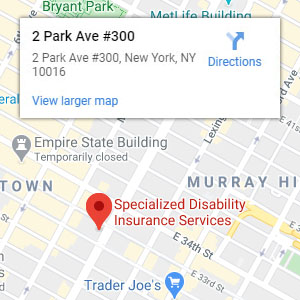Northwestern Mutual Disability Insurance Review

Northwestern Mutual does an excellent job marketing and selling policies, and as a result is one of the largest mutual insurance carriers in the country with an excellent track record. Northwestern Mutual does not allow brokers, like us, to sell their policies. Policies can only be sold by or purchased from a Northwestern Mutual Financial Representatives. The current disability contract does not contain a key definition physicians desire, known as a true own occupation definition for total disability.
- Quality of contract 2.5/5
- Rates4/5
- Application Experience 3/5
- Communication/Service 4/5
- Total score 3.33/5
2019 Financial Ratings:
- Moody’s Investors Service - Aaa
- A.M. Best Company – A++
- Standard & Poor’s - AA+
- Fitch – AAA
- Comdex – 100/100
- Medical Own Occupation Rider: The Insured is Totally Disabled when unable to perform the substantial and material duties of the Regular Occupation. If the Insured can perform one or more of the substantial and material duties of the Regular Occupation, the Insured will be considered Totally Disabled if: the Insured is not Gainfully Employed in an occupation; and more than 50% of the Insured’s time in the Regular Occupation at the time the Disability began was devoted to providing direct patient care and services; and the Insured is unable to perform the substantial and material duties which accounted for more than 50% of the Insured’s charges for direct patient care and services as evidenced by the Billing Codes for the 12 months before the Disability began.
Our Analysis: A definition like this is known as a modified own occupation definition and would not be reliable/desirable as a true own occupation definition.
Partial Disability: Many disabilities allow physicians to continue working, but they may work less or earn less, because of an injury or illness. Therefore, the partial disability benefit is an extremely important clause in the contract.
- Partial Disability Benefit: The trigger to qualify under this rider is at least a 20% loss of income due to injury or illness, and unable to perform one or more but not all of the substantial and material duties of the regular occupation, and is gainfully employed in an occupation.
Northwestern pays a proportionate benefit equal to the percentage of lost income expect:
- During the first 12 months they will be paid the lesser of the full monthly benefit or the loss of earned income (dollar for dollar reimbursement).
- During the first 6 months the proportionate benefit will be at least 50% of the monthly benefit
Recovery benefits are included in this rider. A recovery benefit is payable for up to 12 months when insured returns back to work full time after a qualifying disability and continues to have an income of 20% or more.
Our Analysis: Recovery benefits limited to 12 months can be very limiting.
- Additional Purchase Benefit: This rider allows you to increase coverage every policy anniversary up to age 55. The maximum issue amount is a pool of up to 10,000.
- Future Increase Benefit: This is no cost benefit. NML will automatically adjust your monthly benefit amount every year for the first 6 years of the policy. The increase is tied to the CPI and will be a 2-6% adjustment.
Our analysis: These riders do not lock in as much coverage compared to riders offered by other carriers. This may require a policy holder to need to redo medical underwriting in the future to protect their income as it increases.
- Non Cancellable Guardian Renewable: The Northwestern Mutual TT.NCDI contract is Non- Cancellable to age 67 or age 70. It is conditionally renewable thereafter on an annual to age 80, subject to changes in premium.
- Mental and/or Substance-related Disorders: This benefit includes claims that stem from, drugs, alcohol, stress, anxiety, depression, or burnout. Policies issued by NML contain a 24-month mental nervous benefit period for physicians.
- Presumptive Disability Benefit: Northwestern Mutual pays a Lifetime benefit if loss is total and permanent. The Elimination period gets waved. If the presumptive disability begins before the insureds 50th birthday, the monthly benefit will be paid out at 150%.
- Rehabilitation Benefit: If you are disabled and want to pursue a rehab program NML will consider joining in a program to with your rehabilitation and return to work.
- Waiver of Premium: You do not pay for your coverage after you’re disabled for the elimination period. NML will refund the premiums paid for coverage after the disability began and continue to waive all premiums that become due during your continuous disability.
Our analysis: Northwestern does offer policies that do not contain the Non-Cancellable Guaranteed Renewable clause. It is important to make sure that benefit is included in your plan. When possible, we do suggest having Mental Nervous Benefits payable for the full benefit period rather than being limited to just 24 months. Data shows it is becoming a more common claim and currently ranks as the third most common cause of claim.
- Elimination periods available:90-day, 180-day, and 365-day elimination periods
- Benefit periods available: 2-year, 5-year, age 67, age 70.
- Indexed Income Benefit (IIB) This benefit is designed to increase your monthly benefits on an annual basis during a claim that last for 12 months. The indexed benefit is adjusted once a year to reflect increases in consumer price levels.
- Catastrophic Disability Benefit (CAT): Pays a benefit in addiotnal to the base monthly benefit if the insured requires substantial assistance to perform two or more activities of daily living.
- Dividends: The policy is eligible to share in the divisible surplus, if any, of the Company. This divisible surplus is determined each year. The policy’s share, if any, will be credited as a dividend on the Policy Anniversary. Decisions concerning the amount and appropriate allocation of divisible surplus are within the sole discretion of the Company’s Board of Trustees. There is no guaranteed method or formula for the determination or allocation of divisible surplus. The Company’s approach is subject to change. There is no guarantee of a divisible surplus. Even if there is a divisible surplus, the payment of a dividend on the policy is not guaranteed. Dividends will be: used to reduce premiums; or paid to the Owner when premiums are being waived. Other uses of dividends may be made available by the Company
Our analysis: While Northwestern has historically paid dividends to policy holders, these dividends would not be guaranteed. We view these dividends as a return of overpayment of premiums for the policy.

